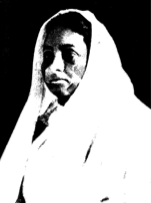Ramabai Dongre Medhavi
Ramabai Dongre Medhavi , called Pandita Ramabai (born April 23, 1858 , † April 5, 1922 ) was an Indian Christian, social reformer and activist.
She was an author, scientist and fought for better living conditions for Indian women. In addition to most of India, she also visited England (1883) and the United States (1886–88). Her father was the Sanskrit scholar Anant Shastri Dongre, her mother Lakshmibai. The father taught the daughter (contrary to the customs of his time, which reserved the learning of Sanskrit exclusively for men) the Puranas , so that Ramabai later made a name for himself as a Sanskrit scholar. The title Pandita was bestowed on her for her profound knowledge of the religious Hindu scriptures.
Although coming from a respected Brahmin family, she married Babu Bipin Behari Madhavi, a lawyer from the lowest, Shudra caste, in 1880, which caused displeasure in Orthodox Hindu circles. When the husband died at the age of twenty-three, she did not want to play the role traditionally intended for higher caste widows and converted to the Anglican Church , causing a scandal that reached into the liberal classes of Calcutta .
Ramabai received a scholarship to study medicine in England. However, she discovered that she was deaf and unable to attend lectures. During her stay, she wrote the feminist classic "The High Caste Hindu Woman," an attack on traditions such as child marriages , polygamy , widow burning and the traditional way of dealing with widowhood . The book, written in Marathi , her mother tongue , was translated into English and widely received in England and America. In India, however, the work written for an Indian audience was not well received.
Pandita Ramabai also translated the Bible into the Marathi language.
She toured the United States in the 1890s and wrote a book about American people and culture from a traveller's point of view, recently published in English translation under the title Pandita Ramabai's American Encounter . It draws a comparison between the status of women in the USA and India and pleads for a deepening of the Indian reform course. The book also criticizes American society, especially racial discrimination. In the United States, Ramabai raised money for a school she founded in India after she returned.
In 1889, Ramabai founded the Mukti Mission (“mukti”, Marathi = “ liberation ”) near Pune in the Indian state of Maharashtra as a refuge for young widows who are set back by their families. At times, over 3,000 young widows were accepted into the Mukti Mission .
The Pandita Ramabai Mukti Mission is still active today and provides housing, education and vocational training for those in need, such as widows, orphans as well as for the blind.
Pandita Ramabai's work was honored by the Indian government with a special postage stamp dated October 26, 1989. In 1994 a Venus crater was named after her: Venus Crater Medhavi .
Memorial days
- Protestant: April 5th in the Protestant name calendar
- Anglican: April 30th
Individual evidence
- ↑ a b http://chnm.gmu.edu/wwh/p/107.html Women in world history
- ↑ ISBN 978-0865902541 "The High Caste Hindu Woman (Hardcover) by Pandita Ramabai Sarasvati"
- ↑ ISBN 978-0253215710 "Pandita Ramabai's American Encounter: The Peoples of the United States (1889) (Paperback) by Pandita Ramabai"
- ↑ PANDITA RAMABAI at www.indianpost.com
- ↑ Medhavi in the Gazetteer of Planetary Nomenclature of the IAU (WGPSN) / USGS (English)
- ↑ Pandita Ramabai in the ecumenical dictionary of saints
Works
- The High-Caste Hindu Woman, Philadelphia, 1887
- The Peoples of the United States, 1889
- The letters and correspondence of Pandita Ramabai / comp. by Sister Geraldine, Bombay 1977
- Pandita Ramabai through her own words - selected works / ed. By Meera Kosambi, New Delhi 2000
literature
- Yan, Suarsana: Pandita Ramabai and the invention of the Pentecostal movement: Postcolonial religious historiography using the example of the "Mukti Revival", Wiesbaden, 2013
- Juneja, Monica: Conversion as resistance. The life story of Pandita Ramabai (1858–1922), in: Gender discourses between fiction and facticity; Waltraud Ernst ... (ed.), Hamburg [a. a.], 2006, p. 153 ff.
- Chakravarti, Uma: Rewriting history: the life and times of Pandita Ramabai, New Delhi 2006
- Kosambi, Meera: Pandita Ramabai's American encounter: the peoples of the United States (1889), Bloomington 2003
- Sengupta, Padmini: Pandita Ramabai Saraswati - her life and work, London 1970
- Lorch, Hilde: Pandita Ramabai: A great Indian, Stuttgart 1950
- Macnicol, Nicol: Pandita Ramabai: The mother of the outcasts / Nicol Macnicol. Authorization Transfer from d. Engl. By P. Baltzer, Stuttgart 1930
- Rhiem, Hanna: Pandita Ramabai and her rescue work, Basel 1913
- Dyer, Helen S .: Pandita Ramabai - the story of her life, London 1907
- Fischer-Lette, Marie: Pandita Ramabai and her work for the Indian widows. - in: Sittlichkeits-Blätter. March 1, 1893
Web links
- biography
- Mukti Mission New Zealand
- Mukti Mission Australia
- Pandita Ramabai Mukti Mission
- Ramabai and Jesus
- Pandita Ramabai
| personal data | |
|---|---|
| SURNAME | Dongre Medhavi, Ramabai |
| BRIEF DESCRIPTION | Indian Christian, social reformer and activist |
| DATE OF BIRTH | April 23, 1858 |
| DATE OF DEATH | April 5, 1922 |
